Table of Contents
Search Keith Jarrett’ best sheet music, books and transcriptions in the Library:
| Artist or Composer / Score name | Cover or sample | Contents (if available)* |
|---|---|---|
| Keith Jarret Arr. It’s Easy To Remember (Jazz Standard by Rogers & Hart) Lead Sheet Music |  | |
| Keith Jarrett Don’t Ever Leave Me (From ‘the Melody At Night, With You’) |  | |
| Keith Jarrett My Song (transcription) |  | |
| Keith Jarrett Blame It On My Youth Keith Jarrett Transcription | Keith-Jarrett-Blame-It-On-My-Youth-Keith-Jarrett-Transcription | |
| Keith Jarrett I Love You Porgy Transcription Pdf |  | |
| Keith Jarrett My Wild Irish Rose | 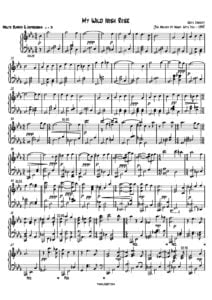 | |
| Keith Jarrett Shenandoah Transcription Pdf |  | |
| Keith Jarrett Time On My Hands |  | |
| Keith Jarrett – Basin Street Blues | Keith-Jarrett-Basin-Street-Blues | |
| Keith Jarrett – Danny Boy (Londonderry Air) Tokyo 2002 (Musescore File).mscz | ||
| Keith Jarrett – Danny Boy (Londonderry Air) Live Tokyo 2002 | 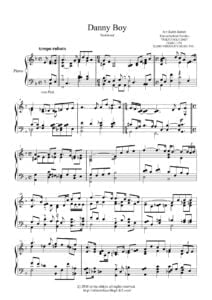 | |
| Keith Jarrett – Don’t Worry ‘Bout Me (from Tokyo Solo 2002) |  | |
| Keith Jarrett – My Funny Valentine (Intro on Still Live) | Keith Jarrett – My Funny Valentine (Intro on Still Live) | |
| Keith Jarrett – Oleo (Keith Jarrett Solo) |  | |
| Keith Jarrett – On Green Dolphin Street Solo | Keith Jarrett – On Green Dolphin Street Solo | |
| Keith Jarrett – Over the Rainbow (Harold Arlen) As performed by Keith Jarrett in Tokyo 1984 | Keith Jarrett – Over the Rainbow (Harold Arlen) As performed by Keith Jarrett in Tokyo 1984 | |
| Keith Jarrett – Over The Rainbow (Musescore File).mscz | ||
| Keith Jarrett – Over The Rainbow Transcription | Keith Jarrett – Over The Rainbow Transcription | |
| Keith Jarrett – Ritooria Score Transcription |  | |
| Keith Jarrett – Spiral Dance |  | |
| Keith Jarrett – Stella by Starlight LIVE at La Fenice sheet music Transcription | Keith Jarrett – Stella by Starlight LIVE at La Fenice sheet music Transcription | |
| Keith Jarrett – The Köln Concert – Original Piano Transcription | 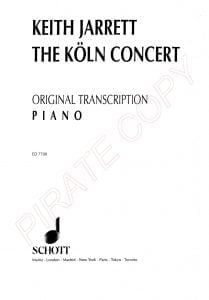 | Keith Jarret Köln concert |
| Keith Jarrett – The Melody At Night With You Sheet Music | 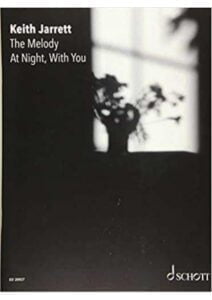 | Keith Jarrett I Love You Porgy Transcription Pdf |
| Keith Jarrett – Tokyo Encore (1976) | Keith Jarrett – Tokyo Encore (1976) | |
| Keith Jarrett – Transcriptions vol. 1 | 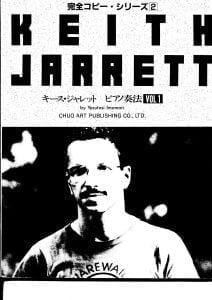 | Keith Jarrett – Trans. vol.1 |
| Keith Jarrett – Transcriptions vol. 2 | 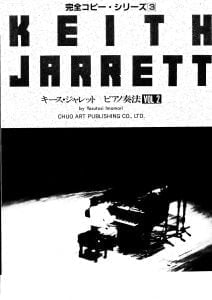 | Keith Jarrett – Trans. vol.2 |
| Keith Jarrett – What Is This thing called Love | 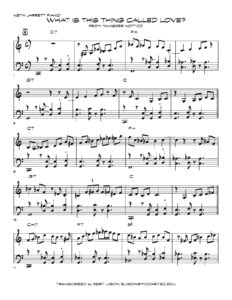 | |
| Keith Jarrett (Jean-Pierre Jackson (Français – French) Book | 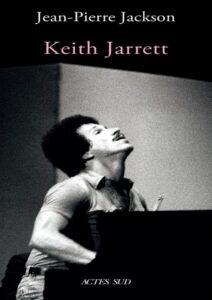 | |
| Keith Jarrett All The Things you Are (lead sheet transcription) | Keith Jarrett All The Things you Are (lead sheet transcription) | |
| Keith Jarrett Be My Love transcription Jazz Standard Piano Solo Sheet Music | 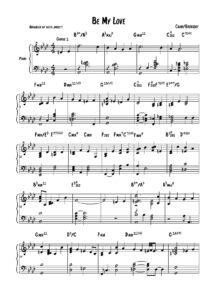 | |
| Keith Jarrett Body And Soul Intro and Conclusion Transcription | 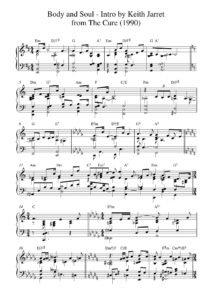 | |
| Keith Jarrett Butch And Butch piano sheet music transcription | 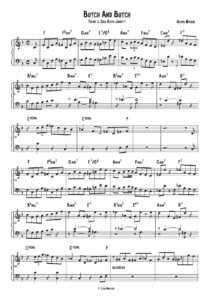 | |
| Keith Jarrett Country (Transcription) | Keith Jarrett Country (Transcription) | |
| Keith Jarrett Danny Boy | Keith Jarrett Danny Boy | |
| Keith Jarrett Heartland Transcription | Keith Jarrett Heartland Transcription | |
| Keith Jarrett I Got It Bad (And That Ain’t Good) Piano Transcription Pdf | 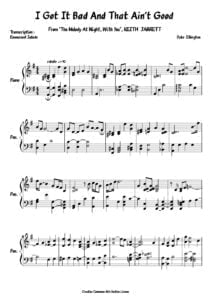 | |
| Keith Jarrett I hear a Rhapsody (transcription lead sheet) | 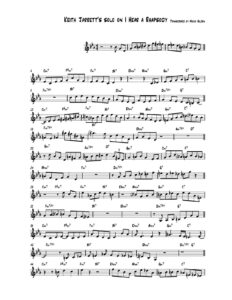 | |
| Keith Jarrett I Loves You Porgy (Musescore File).mscz | ||
| Keith Jarrett I Loves You Porgy (Parts A And B) (Musescore File).mscz | ||
| Keith Jarrett I Remember Clifford Transcription from Still Live |  | |
| Keith Jarrett It could happen to you (solo ) | Keith Jarrett It could happen solo | |
| Keith Jarrett It Could Happened To You | 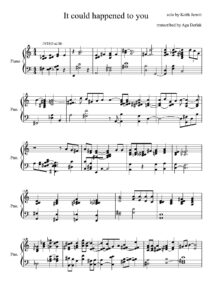 | |
| Keith Jarrett La Scala Concert transcription | 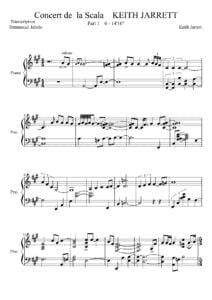 | |
| Keith Jarrett more transcriptions.rar | Keith Jarrett I Got It Bad And That Aint Good Transcription | Keith Jarrett More transcriptions |
| Keith Jarrett My Funny Valentine Transcription | 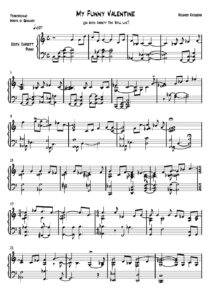 | |
| Keith Jarrett My Song (Vermont concert transcription) | 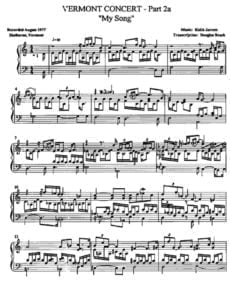 | |
| Keith Jarrett My Song Budokan Concert transcription |  | |
| Keith Jarrett My Wild Irish Rose Transcription |  | |
| Keith Jarrett Paris Concert Intro Transcription (1990) | Keith Jarrett Paris Concert Intro Transcription (1990) | |
| Keith Jarrett Piano Collection vol. 1 |  | Keith Jarrett Piano Collection vol. 1 jazz sheet music |
| Keith Jarrett Piano Trio Transcriptions | 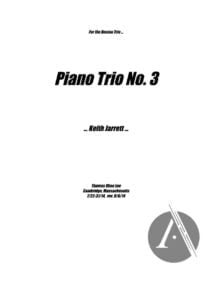 | Keith Jarrett Piano Trio Transcriptions |
| Keith Jarrett Real Book (Unofficial Transcriptions Made By Fans Of His Music) | 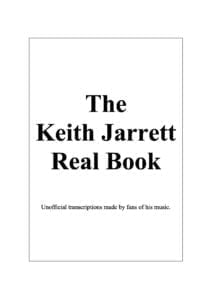 | Keith Jarrett real book |
| Keith Jarrett Remember April | 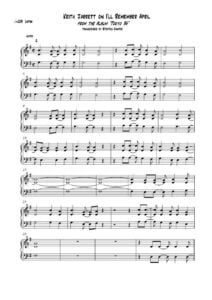 | |
| Keith Jarrett Sapporo Part 1 transcription sheet music Sun Bear concert | 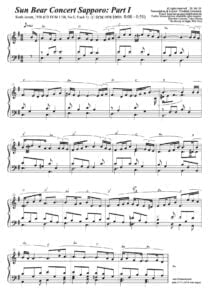 | |
| Keith Jarrett Solo plays standards (transcriptions) | Keit Jarrett solos (transcriptions) | Keith Jarrett Solos plays Standards (transcriptions) |
| Keith Jarrett Solos – Someone to watch over me (sheet music transcription) | Keith Jarrett Solos – Someone to watch over me (sample) | |
| Keith Jarrett Solos – The Night we called a day (transcription) | Keith Jarrett Solos – The Night we called a day (transcription) | |
| Keith Jarrett Someday my Prince Will Come (Transcription) | Keith Jarrett piano-solo-Someday my prince will come | |
| Keith Jarrett Someone to watch over me (Gershwin) | Keith Jarrett Someon to watch over me (Gershwin) | |
| Keith Jarrett Stella By Starlight Piano Solo Transcription Ned Washington Victor Young (on Standards Live) Jazz Standard | 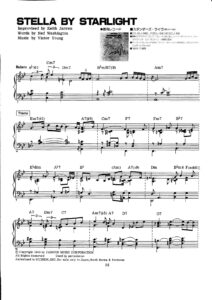 | |
| Keith Jarrett The Man And His Music by Ian Carr (Book) Keith Jarrett’s biography | 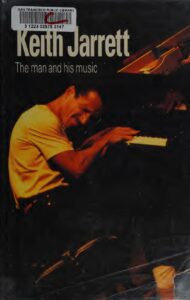 | |
| Keith Jarrett Tokyo solo part 2 transcription |  | |
| Keith Jarrett Transcription sheet music of Margot | 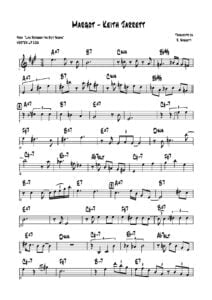 | |
| Keith Jarrett Transcription sheet music of Prism |  | |
| Keith Jarrett Transcription sheet music of Radiance Part 3 |  | |
| Keith Jarrett Transcription sheet music of Radiance Part 8 |  | |
| Keith Jarrett Transcription sheet music of Staircase Part 3 |  | |
| Keith Jarrett Transcription sheet music of Sunshine Song Intro | 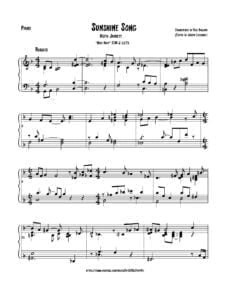 | |
| Keith Jarrett Transcription sheet music of Be My Love | Keith Jarrett Transcription sheet music of Be My Love | |
| Keith Jarrett Transcription sheet music of In your quiet place | Keith Jarrett Transcription sheet music of In your quiet place | |
| Keith Jarrett Transcription sheet music of It’s All In The Game Sheet Music | Keith Jarrett Transcription sheet music of In your quiet place | |
| Keith Jarrett Transcription sheet music of Last Solo Final Impromptu | 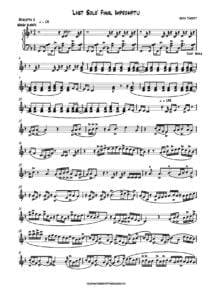 | |
| Keith Jarrett Transcription sheet music of My Funny Valentine | 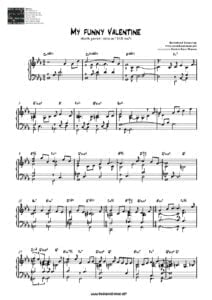 | |
| Keith Jarrett Transcription sheet music of Old Man River |  | |
| Keith Jarrett Transcription sheet music of Piano Solo Autumn Leaves |  | |
| Keith Jarrett Transcription sheet music of Questar |  | |
| Keith Jarrett Transcription sheet music of So Tender Guitar Arr. (Standards Vol 2) |  | |
| Keith Jarrett Transcription sheet music of Testament Part 1 | 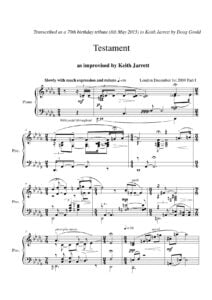 | |
| Keith Jarrett Transcription sheet music of The Carnegie Hall Concert Part Vii | 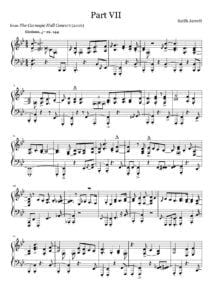 | |
| Keith Jarrett Transcription sheet music of The Wind |  | |
| Keith Jarrett Transcription sheet music of U Dance | 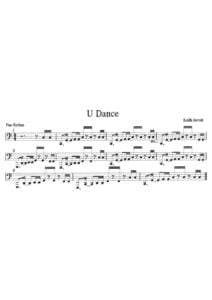 | |
| Keith Jarrett Trio – All the Things You Are | Keith Jarrett Trio – All the Things You Are | |
| Keith Jarrett Trio – When You Wish Upon a Star | Keith Jarrett Trio – When You Wish Upon a Star | |
| Keith Jarrett Various Transcriptions |  | Keith Jarrett Transcriptions |
| Keith Jarrett You and the night and the music(full transcription) | Keith Jarrett You and the night and the music sheet music pdf | |
| Keith Jarrett- Don’t Worry ’bout Me (From Tokyo Solo 2002) (First Part) (Musescore File).mscz | ||
| Keith Jarrett’s It Could Happen To You (Live in Tokyo, 1996) | 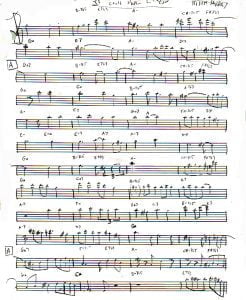 | |
| Keith Jarrett’s The Köln Concert By Elsdon, Peter (Book) | 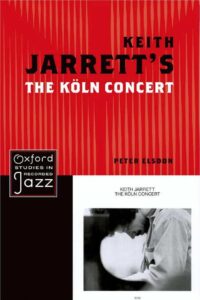 | |
| Keith Jarrett Paris Concert 1988 Opening Transcription | Keith Jarrett Paris Concert 1988 Opening Transcription | |
| Keith Jarrett Paris Concert 1988 Blues Transcription | Keith Jarrett Paris Concert 1988 Blues Transcription |
Keith Jarrett – The Köln Concert [Full Album 1975]
Keith Jarrett The Köln Concert Opera House in Köln, Germany. January 24th, 1975. 00:00:00 | – | 01 – Part I 00:26:15 | – | 02 – Part II a 00:41:11 | – | 03 – Part II b 01:00:30 | – | 04 – Part II c Keith Jarrett – piano All tracks are written by Keith Jarrett.
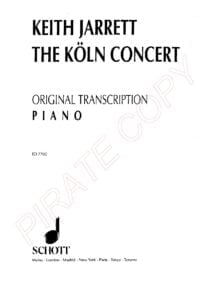
Best Sheet Music download from our Library.
Come join us now, and enjoy playing your beloved music and browse through great scores of every level and styles!
Can’t find the songbook you’re looking for? Please, email us at: sheetmusiclibrarypdf@gmail.com We’d like to help you!

Keith Jarrett
Who Was Keith Jarrett?
Keith Jarrett (May 8, 1945 – September 3, 2023) was an American pianist and composer who is widely regarded as one of the most gifted, innovative, and influential musicians in modern jazz and beyond. While his roots were in jazz, his work defied easy categorization, seamlessly blending elements of classical, folk, gospel, blues, and avant-garde into a uniquely personal and expressive language.
His career was famously divided into distinct, equally significant phases:
- The Sideman: He began with iconic figures like Art Blakey’s Jazz Messengers and most notably, the Miles Davis electric band during a revolutionary period (1970-71), where he played electric organ and keyboards.
- The American Quartet: His acclaimed group with Dewey Redman (sax), Charlie Haden (bass), and Paul Motian (drums) from 1971-1976, known for its deep, earthy, and exploratory acoustic jazz.
- The European Quartet: His equally celebrated group with Jan Garbarek (sax), Palle Danielsson (bass), and Jon Christensen (drums), which had a cooler, more lyrical and folk-influenced sound.
- The Standards Trio: For three decades (1983-2014), his trio with Gary Peacock (bass) and Jack DeJohnette (drums) became the gold standard for the piano trio, redefining the American songbook with unparalleled interplay and invention.
- The Solo Improviser: His legendary completely unplanned, solo piano concerts, which remain his most famous and groundbreaking contribution.
Why He Was So Important and Influential
Jarrett’s importance stems from a combination of virtuosic talent, a relentless creative spirit, and a philosophical approach to music that few have matched.
1. The Master of Spontaneous Composition: The Solo Concerts
This is Jarrett’s most monumental contribution. Unlike most jazz, which is based on improvising over a pre-existing chord structure (a “standard”), Jarrett’s solo concerts were created from absolute nothingness.
- No Plan, No Material: He would walk onto a stage with no preconceived themes, melodies, or ideas. He famously insisted that even the concert promoters not provide a set list, as there was none.
- Creating in Real-Time: The entire concert—which could last over an hour without a break—was a continuous flow of music invented on the spot. He tapped into a profound, almost trance-like state, and the music seemed to channel through him, ranging from ferocious, percussive rhythms to hymns of breathtaking beauty.
- The Köln Concert: The album recording of his 1975 performance in Cologne, Germany, is the best-selling solo piano album in history and arguably the most famous jazz album ever recorded. Its accessibility, emotional depth, and stunning creativity introduced millions of listeners to the possibilities of improvisation and remains a landmark recording.
This approach proved that music of immense structural complexity and deep emotional resonance could be created entirely in the moment, elevating improvisation from mere embellishment to the level of high composition.
2. Redefining the Piano Trio
With his “Standards Trio” featuring Gary Peacock and Jack DeJohnette, Jarrett did something radical: he revisited the Great American Songbook not to simply play the tunes, but to deconstruct and reinvent them.
- Deep Dialogue: The trio’s performances were profound conversations. They would stretch the harmonies, rhythms, and forms of classic tunes (like “My Funny Valentine” or “Autumn Leaves”) to their limits, all while maintaining an almost telepathic connection. They didn’t just play the songs; they explored their very essence.
- The Gold Standard: For decades, they were the benchmark against which all other modern jazz piano trios were measured, influencing countless musicians to approach trio playing as a collaborative, egalitarian, and deeply creative enterprise.
3. A Unique and Recognizable Style
Jarrett’s playing was instantly recognizable:
- Physicality: He was known for his intense physical involvement—grunting, moaning, standing up, and contorting his body as he played. This was not for show; it was a visible manifestation of his complete and total immersion in the music.
- Vocalization: His audible groans and singing along with his lines were a famous part of his sound, a sign of his deep connection to the music’s emotional core.
- Lyrical Romance and Rhythmic Fury: He could shift in a heartbeat from passages of sublime, classical-inspired melody to explosions of raw, rhythmic energy rooted in the blues and gospel.
4. Bridging Musical Worlds
Jarrett refused to be confined by genre. He was a serious classical musician who recorded acclaimed interpretations of Bach, Handel, Shostakovich, and Bartók. He composed modern classical works, including string quartets and a symphony. This deep respect for the classical tradition, combined with his jazz genius, allowed him to create a synthesis that felt both intellectually rigorous and spontaneously alive. He demonstrated that a musician could be a master of multiple disciplines without diluting either.
5. The Legend of the Perfectionist
Jarrett was famously demanding, both of himself and his environment. He was known for stopping performances due to audience noise, coughing, or poor piano quality. While sometimes controversial, this stemmed from an extreme reverence for the music and the conditions necessary for deep creation. It reinforced the idea that live music is a sacred, fragile exchange requiring focus and respect from both the artist and the audience.
Legacy and Influence
Keith Jarrett’s influence is vast and can be heard in:
- Pianists: Nearly every jazz pianist who emerged after the 1970s has been touched by his work, from Brad Mehldau and Esbjörn Svensson to Shai Maestro and countless others. His approach to harmony, rhythm, and solo storytelling is a foundational part of the modern jazz piano language.
- All Improvisers: He expanded the very idea of what improvisation could be, inspiring musicians of all instruments to be more daring, personal, and compositionally minded in their solos.
- Listeners: He brought a new audience to jazz and instrumental music, proving that abstract, improvised music could be both intellectually challenging and immensely popular, connecting with people on a primal, emotional level.
Keith Jarrett was important because he redefined the potential of the piano and the very act of musical creation itself. He was a virtuoso who played with raw emotion, a composer who worked without a score, and a purist who merged genres. He left behind a body of work that stands as a testament to the power of human spontaneity and the boundless possibilities of a single instrument in the hands of a genius.
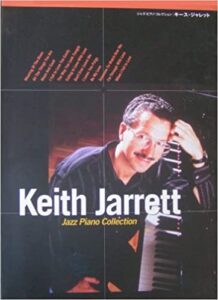
Please, subscribe to our Library.
If you are already a subscriber, please, check our NEW SCORES’ page every month for new sheet music. THANK YOU!

Browse in the Library:
Or browse in the categories menus & download the Library Catalog PDF:
